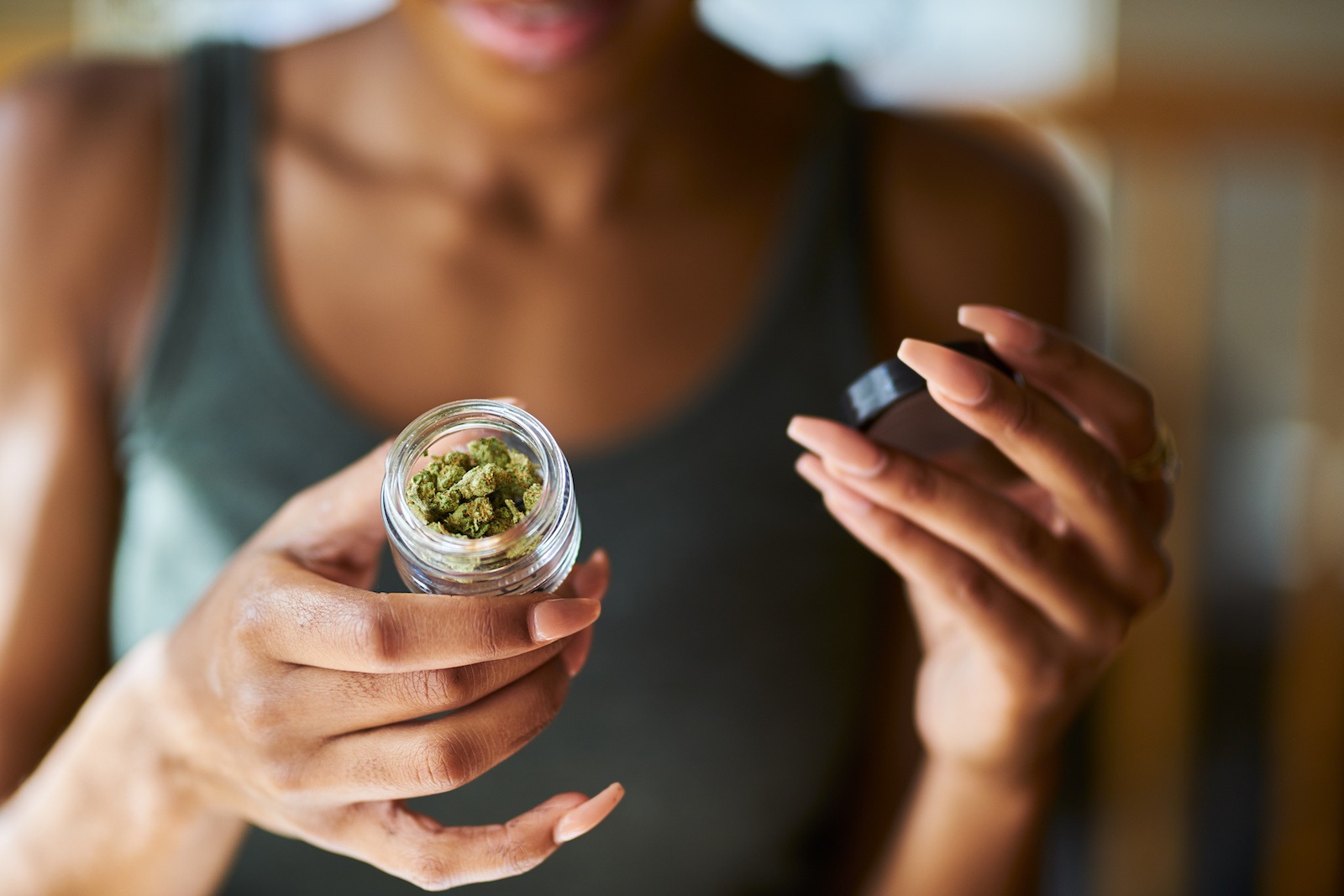Addiction | 5 min read
Cannabis in Pill Form: Side Effects, Risks, and Signs of THC Pill Addiction
Medically Reviewed By

On July 22, 2025
Written By
On September 7, 2022

What you will learn
- Cannabis pills are oral capsules that contain concentrated cannabinoids, usually THC, CBD, or both.
- THC pills are becoming more popular for both medical and recreational use.
- When you ingest THC in pill form, it passes through your digestive system and is metabolized by the liver before entering the bloodstream.
- THC in pill form may seem safer due to the lack of smoke and the ability to control dosage more precisely, but it still carries risks related to overconsumption, delayed onset, and dependence.
Cannabis is no longer limited to joints or edibles. Many people are using cannabis in pill form as a discreet and smokeless alternative. Commonly known as THC pills, weed pills, marijuana pills, CBD capsules, or cannabis tablets, these products are becoming more popular for both medical and recreational use.
But like any other form of marijuana, THC in pill form carries side effects, health risks, and the potential for addiction. If you’re considering cannabis capsules or already using them, it’s essential to understand how they differ from other forms of cannabis and what to watch for.
What Are THC Pills or Cannabis Tablets?
Cannabis pills are oral capsules that contain concentrated cannabinoids, usually THC, CBD, or both. These capsules are taken like a supplement or medication, making them a smoke-free way to consume cannabis.
There are two primary types:
- Isolated THC pills: Contain only tetrahydrocannabinol (THC), the psychoactive component responsible for the cannabis euphoria.
- Full-spectrum cannabis tablets: Contain a blend of cannabinoids and other plant compounds for a broader effect.
Cannabis in pill form offers more controlled dosing, which is appealing if you want consistency for chronic pain, anxiety, or a regulated recreational high.
How Does THC in Pill Form Work?
When you ingest THC in pill form, it passes through your digestive system and is metabolized by the liver before entering the bloodstream. This process converts THC into 11-hydroxy-THC, a metabolite that is more potent per milligram and may produce a stronger and longer-lasting effect than inhaled THC in some users.[1]
Unlike vaping or smoking cannabis, the onset of effects with marijuana pills can take 30 to 90 minutes. However, the experience can last 4 to 8 hours or longer, depending on the amount of THC.
Differences Between THC Capsules and Other Forms of Cannabis
- Precise dosage: Cannabis tablets typically come in clearly labeled doses like other pills, allowing you to monitor your intake more accurately. This is more difficult to accomplish if you’re smoking weed, taking homemade cannabis edibles, or using other consumption methods.
- No smoke or odor: With weed pills, there’s no inhalation or combustion. This eliminates the risk of lung damage and exposure to secondhand smoke. It’s also a more discreet way to use cannabis and has no smoke, smell, or paraphernalia.
- Extended duration: Cannabis in pill form tends to have longer-lasting effects than inhaled cannabis due to slower gastrointestinal absorption and hepatic metabolism. This is a benefit for medical uses, but may increase the risk of overconsumption or dependence with recreational use.
- Delayed onset: The effects of THC in cannabis pills are not immediate, so you may feel tempted to take more before the first dose kicks in. This can lead to unintentional overuse or more potent side effects.
Side Effects of Weed Pills
THC in pill form may seem safer due to the lack of smoke and the ability to control dosage more precisely, but it still carries risks related to overconsumption, delayed onset, and dependence.
The short-term side effects of weed pills may include:[2]
- Euphoria
- Altered sensory perception and time distortion
- Dry mouth and eyes
- Drowsiness or fatigue
- Nausea or vomiting
- Impaired memory and coordination
- Paranoia or anxiety
- Hallucinations or psychosis at high doses
The long-term risks of cannabis pills include:[3]
- Increased tolerance
- Cognitive impairment
- Dependence
- Addiction
- Increased risk of psychotic disorders like schizophrenia
Because oral THC is metabolized into 11-hydroxy-THC by the liver, users may experience stronger or longer-lasting effects even if the milligram dose is equivalent to inhaled THC.
Is It Possible to Get Addicted to Cannabis in Pill Form?
Yes. Though cannabis has a lower risk of addiction than hard drugs like opioids or stimulants, frequent use of THC in pill form can still lead to cannabis use disorder, especially if you’re taking the drug to self-medicate emotional stress or use it frequently or at high doses.
Signs of cannabis use disorder may include irritability between doses, persistent cravings, increased tolerance, inability to cut down despite efforts, and continued use despite negative consequences.[4]
You may also experience irritability, restlessness, physical discomfort, or cravings when not using cannabis.
It’s also important to remember, since more and more people are using weed for medical reasons, like pain relief or to alleviate the symptoms of epilepsy, that taking it for medical reasons can sometimes look like an addiction. However, it may still be the most effective way to manage your symptoms.
If you are a medical marijuana user and are concerned about addiction, it’s a good idea to talk with a healthcare professional. They may have more information about alternatives and risks of addiction and can help you decide when and if using weed is a good option for you and your condition(s).
Can You Become Addicted to Medical Cannabis?
While medical cannabis is used therapeutically, it still carries a risk of dependence and cannabis use disorder, particularly with long-term or high-dose use. Medical use doesn’t eliminate the risk of dependence. Someone using cannabis in pill form for chronic pain, seizures, or anxiety should regularly consult with their doctor to monitor side effects, evaluate effectiveness, and explore other treatment options as needed.
How To Get Help If Addicted to Weed Pills
If you realize that you or a loved one is addicted to weed pills, the good news is that there is help for you, and you don’t have to deal with this problem on your own. You can find the treatment and support you need to overcome addiction and live a happy and healthy life.
The first step in dealing with addiction is always recognizing that you have an addiction. So, if you’ve already made that realization, congratulations! You’re already on the path to recovery.
The next step is figuring out what you want to do about your addiction. Withdrawal from THC pills and other cannabis products is typically milder than withdrawal from substances like opioids or alcohol, but may still involve symptoms such as irritability, sleep disturbances, and appetite changes. That means some people may be more successful at home than dealing with other addictions.
However, that doesn’t mean stopping weed at home is right for everyone. You may also consider looking for local support systems or seeing what programs a drug addiction treatment center offers.
If you think a treatment center may be right for you and are serious about overcoming an addiction to weed pills, Ascendant NY is here to help. Contact us to learn more about our programs, get answers to your questions, or start the intake process and overcome your addiction.
Start Your Recovery
Cannabis in pill form may be convenient and discreet, but like any substance, cannabis pills come with risks. If you’re experiencing side effects, using more than intended, or feeling dependent on THC pills, you don’t have to face it alone. Weed addiction treatment can help you identify the underlying causes of addiction, learn healthier habits, and prepare for a substance-free future.
Frequently Asked Questions About THC in Pill Form
The legality of THC pills depends on the jurisdiction. In many U.S. states, they’re legal for medical or recreational use, but places that haven’t legalized marijuana consider cannabis in pill form illegal.[5] Always check local laws before purchasing or using marijuana products.
While it’s unlikely to be fatal, you can take too much THC in pill form, just like any other cannabis product. This can cause intense side effects like paranoia, hallucinations, nausea, and panic attacks. Start with a low dose and wait at least 90 minutes before taking more to assess how it affects you.
Yes, cannabis pills containing THC can be detected by standard drug tests. Detection windows vary based on the frequency of use, dose, and type of test (urine, blood, saliva, or hair).[6]
Ascendant New York Editorial Guidelines
Here at Ascendant New York, we understand the importance of having access to accurate medical information you can trust, especially when you or a loved one is suffering from addiction. Find out more on our policy.
[1] Chayasirisobhon, S. (2020, December). Mechanisms of action and pharmacokinetics of cannabis. The Permanente journal. https://pmc.ncbi.nlm.nih.gov/articles/PMC8803256/
[2,3,4] U.S. Department of Health and Human Services. (2024, October 28). Cannabis (marijuana). National Institutes of Health. https://nida.nih.gov/research-topics/cannabis-marijuana
[5] Where is marijuana legal? A guide to marijuana legalization. (n.d.-e). https://www.usnews.com/news/best-states/articles/where-is-marijuana-legal-a-guide-to-marijuana-legalization
[6] MediLexicon International. (n.d.). How long does marijuana stay in your system? blood, urine, and hair. Medical News Today. https://www.medicalnewstoday.com/articles/324315




